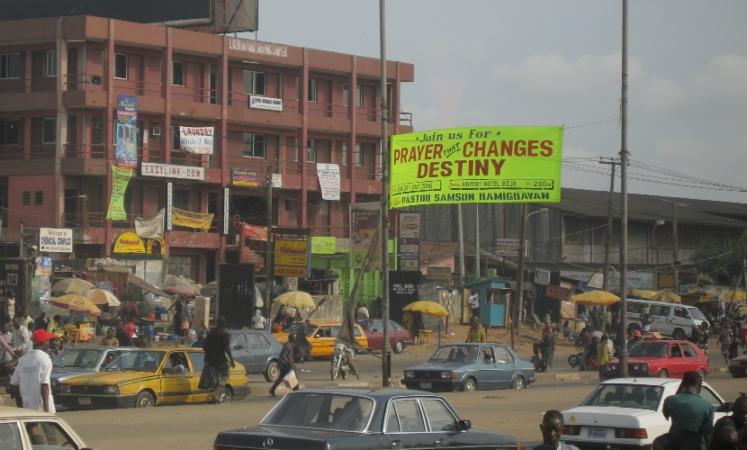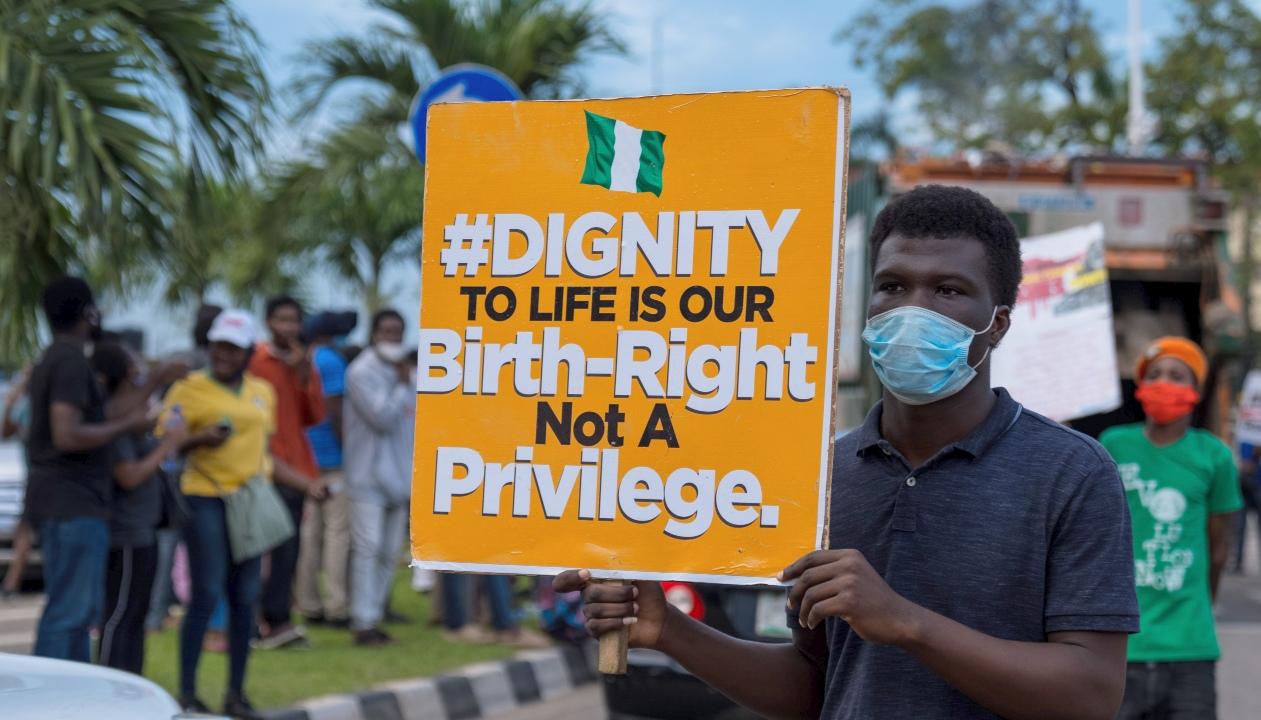Over the past few decades in Nigeria, many millions of people have joined Pentecostal churches, and the most popular brand in recent years is known as the ‘prosperity gospel’. But while these hugely popular churches promise economic as well as spiritual rewards, they are also controversial. Even as their leaders condemn corruption, critics see these churches as contributing to a political culture that perpetuates inequality.
In south-eastern Nigeria, Pentecostal Christianity is firmly established and still growing. New churches seem to spring up nearly every day. Sunday services overflow and people attend all manner of additional prayer meetings and Bible studies. Television and radio stations broadcast extensive Pentecostal programming. Billboards and banners everywhere announce evangelical crusades, deliverances, miracle-working and opportunities to participate in spiritual warfare against the Devil.
Beyond its religious appeal, Pentecostal Christianity is a dominant feature of the political and cultural landscape. Trucks, buses, cars and motorcycles are adorned with born-again bumper stickers and painted-on attestations of faith. Popular music and ubiquitous Nigerian-made videos frequently foreground themes inspired by Pentecostal Christianity. Politicians make spiritual pledges as well as political and economic promises.
One brand of Pentecostal practice that is especially popular in Nigeria is what is often referred to as the ‘prosperity gospel’. Prosperity churches promise the faithful not only spiritual salvation but also improved social and economic circumstances. At the same time that these churches are popular, they are also controversial.
Chief among the misgivings about prosperity churches for non-members is the spectre of corruption. These concerns are fuelled by media accounts of church scandals, rumours of church leaders’ extreme wealth and the perception that corrupt elites join these churches in an attempt to legitimise their ill-gotten riches through religious performance. Reflecting this unease, a common joke where I work in south-eastern Nigeria is that for many unemployed graduates their best prospect for a lucrative future would be to found a church.
But while some Nigerians view prosperity churches as profit-making enterprises for their charlatan leaders and religious cover for elites’ illicit wealth, members of these churches certainly do not see things this way. Instead, they commonly interpret the riches that accrue to church founders, pastors and successful fellow congregants as evidence of God’s blessing. Further, they see their own faith as yielding many benefits, even when they are not visibly prosperous in monetary terms.

In these circumstances, it seems ironic that prosperity church pastors frequently tap into Nigerians’ discontents about corruption to attract followers. Preachers routinely rail against venality even as they attribute their own wealth to the rewards of faith. In a recently published article, I explore the question of how followers of prosperity churches can be at once deeply discontented about corruption-induced inequalities and at the same time see the disparities in their own churches not as the result of exploitation or fraud but as proof of God’s work.
I attended many services at prosperity churches as part of my research. The juxtaposition of church leaders’ boastful assertions that their own wealth was the reward for their faith with a relentless call for tithes and contributions from their congregations often made me uncomfortable.
In one example, the founder of a church preached about the importance of sacrifice, using the story of Abraham to emphasise the significance of giving up the first among things one loves as a sign of true faith. After recounting how his own sacrifices were richly rewarded by God, the founder’s oration culminated in asking all the members to donate their first month’s salary (this was the last Sunday of January) to the church. Church officiants passed out papers upon which congregants were asked to write down their pledges and cell phone numbers, in recognition that few, if any, church members would be capable of contributing such sums on the spot.
Although people submitted their pledges with no obvious hesitation, I found it hard to ignore the possibility that these kinds of contributions made the founder rich. But no one I interviewed thought the founder’s wealth was ill gotten. Indeed, the people I spoke with firmly believed their own lives were – or would become – better through their participation in this church. As evidence, people talked of things like new business opportunities, a child’s admission to secondary school, or finding a flat to rent in a tight urban real estate market since joining the church.
Instead of exacerbating corruption and inequality as critics contend, adherents of the prosperity gospel see their churches as places that help them address these problems. How does this work? In addition to finding spiritual succour, members of prosperity churches become part of communities and wider social networks that give them a leg up in navigating the shifting relationships between ‘haves’ and ‘have-nots’ in Nigerian society. People see their faith, their churches and the relationships created in these new congregations as enabling them to find their way in a rapidly changing and, in many ways, highly insecure political and economic landscape.
The social ties created through church participation, enhanced by a shared sense of sacrifice engendered by tithing, bind people in mutually beneficial reciprocal relationships, including across economic hierarchies. Attention to the everyday experiences of Pentecostals, both inside and outside their churches, suggests that the benefits of faith come via quotidian social relations enabled by church membership as well as from perceived spiritual transformation.
But what has been the overall impact of prosperity churches, and Pentecostal Christianity more generally, on politics, inequality and corruption in Nigeria? Without a doubt, Pentecostal pastors have helped elevate discontent about corruption in national discourse. Yet my findings suggest the limits of the prosperity gospel’s politically constructive possibilities.
Specifically, the role that these churches themselves play in the reproduction of inequality suggests that they often perpetuate rather than challenge problematic disparities. Preachers of the prosperity gospel – especially the ‘owner’-founders of bigger churches – appear to become rich from the contributions of their followers. More broadly, the moral legitimacy provided to elites if they donate significant sums to their churches mitigates Pentecostalism’s potential to radically reshape Nigeria’s political culture. As long as the prosperity gospel interprets the accumulation of wealth as evidence of a believer’s faith and God’s blessing, this popular brand of Christianity is unlikely to promote a class struggle that matches its call for spiritual warfare.
Photo by Daria Shevtsova from Pexels.






I was interviewing some young men and asked them how they chose their Church (this was near the Lagos – Ibadan highway where many of them are situated) and they said they would go to one on Sunday. If their fortunes hadn’t got better in the following week they would move to another. They believed riches could pour down if, with God’s help, they were in the right place at the right time.